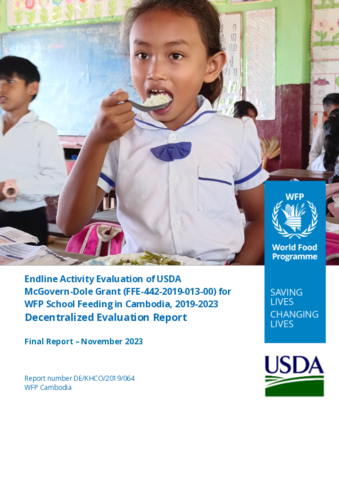
The evaluation covered the following activities: a) School Feeding; b) Nutrition; c) Quality of Education. The evaluation was commissioned to assess (a) whether targeted beneficiaries received services as expected and (b) if the project met its stated goals and objectives in line with the results frameworks and assumptions, and in relation to the baseline and mid-term findings.
Additionally, the evaluation analyzed incorporation gender, equity, and wider inclusion objectives and the extent of gender equality and women’s empowerment mainstreaming principles in the design and implementation of the evaluation.
It was intended for both accountability and learning purposes. It focused on assessing the relevance, effectiveness, efficiency, sustainability, and impact.
Overarching evaluation questions were designed:
- to determine if the McGovern-Dole objectives and design respond to the needs of stakeholders and institutions.
- to determine if McGovern-Dole activities achieved objectives and results, including possible differences across groups or institutions
- to determine if McGovern-Dole activities are utilizing resources well and delivered results in an economical and timely manner
- to determine if the McGovern-Dole FFE project had unintended positive or negative outcomes or impact, and what difference(s) the McGovern-Dole FFE project made overall
- to determine if McGovern-Dole FFE project results, benefits, and outcomes are likely to continue after the program concludes
- to determine the likelihood of the benefits of the program continuing beyond WFP’s intervention for the targeted beneficiaries and improvements should be made to the School Feeding Program (SFP) in the future.
Key evaluation findings included:
- The project remains highly relevant, and all stakeholders expressed their appreciation of the project. Moreover, the multi-dimensional capacity strengthening activities were relevant to meet the Government’s needs to support management and the implementation of the national school feeding program. The project clearly benefits regardless gender, despite the lack of gender sensitive indicators in the Results Framework.
- Positive changes have been observed since the midterm. Most results framework indicators have met or exceeded their targets, including enrolment, dropout, health-related absenteeism, attentiveness and literacy. Substantive milestones included the Joint Transition Strategy, a key Sub-decree, and the advanced stages of the National School Feeding Policy, as well as the support on monitoring, evaluation and reporting systems.
- Budget details were broadly aligned with the program design, and the expenditure was at 86 percent due to delays during the pandemic. However, this evaluation could not draw firm conclusions on financial efficiency, and the project is still underway.
- The project positively impacted government reporting systems, school infrastructure, and increased involvement of communities and communes with the Home-Grown School Feeding Program (HGSFP). The CO’s internal adjustments in terms of staff capacity, and support from its regional bureau and HQ, have had positive impacts on the project achievements, but gaps remain and relying on external experts.
- The Government is likely to continue the SFP after WFP and USDA support ends, as the NHGSFP is a priority. However, the absence of a NHGSFP-dedicated team within the Ministry of Education, youth and Sport (MoEYS) remains a concern as staff cover a range of other tasks. Capacity strengthening needs remain for national and sub-national government staff on implementation, management and reporting skills.
Key recommendations from the evaluation were:
- WFP CO, together with MoEYS and other relevant government stakeholders, should conduct an assessment of technical assistance needs at different levels.
- WFP should play a role in convening stakeholders and facilitating optimal coordination between government entities (ministries, and departments within ministries) as well as at the community level.
- WFP CO should continue its efforts, with the Ministry of Women’s Affairs (MoWA), to seek to integrate increased gender sensitivity into school meals processes.
- WFP CO should continue to improve their staffing profile to ensure sufficient in-house capacity to provide technical assistance.
- WFP CO should improve their M&E systems to be able to easily monitor their project(s).
